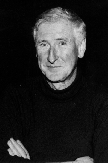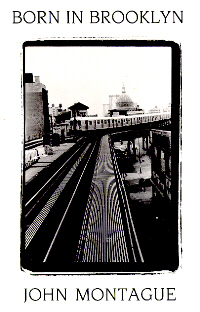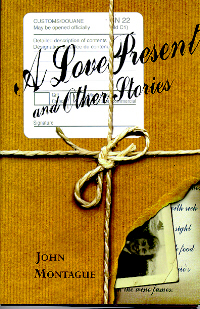
| NYWI HOME PAGE | VISITING WRITERS & EVENTS INDEX | VIDEO ARCHIVES |
 |
NYS Writers Institute, April 16, 1999
8:00 p.m. Poetry reading
with Maxine Kumin and Robert Creeley
Associated Writing Programs Annual Conference
Albany Omni Hotel
| � |
PROFILE
Although he is one of the best known Irish poets since Yeats, John Montague was, surprisingly enough, born in Brooklyn, New York, on February 28, 1929. His father, James Montague, an Ulster Catholic, from County Tyrone, had gone to America in 1925 to join his brother John. Both were sons of John Montague, who had been made a Justice of the Peace by Queen Victoria, combining his legal duties with being a schoolmaster, farmer, postmaster and director of several firms. John continued as postmaster but James became involved in the turbulent national scene in the years after 1916, particularly complicated in areas like Fermanagh and Tyrone, on the borders of North and Southern Ireland. Mary Montague joined her husband James in America, in 1928, with her two elder sons. So John was born on Bushwisk Avenue, St. Catherine’s Hospital, and spent his earliest years playing with his brothers in the streets of Brooklyn, putting nickels on the trolley lines, playing on a tenement roof, seeing early Mickey Mouse movies.
Although Uncle John ran a speakeasy, where he employed his brother, James Montague did not find life in New York easy during the Depression years. So the three boys were shipped back to Ireland in 1933, the two eldest to their maternal grandmother’s house, where they were born, but John to his father’s and grandfather’s home at Garvaghey, now maintained by two spinster aunts who welcomed the boy of four.
 From New York to a farm on the edge of the Clogher Valley in County Tyrone was a significant step backwards in time. John did all the usual farming chores. He became a normal Ulster farm child, though haunted by the disparity between what the house in Garvaghey had been, in the days of his grandfather, and namesake, and the reduced present.
From New York to a farm on the edge of the Clogher Valley in County Tyrone was a significant step backwards in time. John did all the usual farming chores. He became a normal Ulster farm child, though haunted by the disparity between what the house in Garvaghey had been, in the days of his grandfather, and namesake, and the reduced present.
John went first to Garvaghey School and then to Glencull, three miles away, where he was coached by a young and ardent master. Scholarships brought him to St. Patrick’s College Armagh, the junior Diocesan Seminary and the place where his Jesuit uncle, Thomas Montague, had gone. While he knows the present cardinal and most of the priests of the diocese of Armagh, John did not discover a religious vocation until he came to write poetry, the first of his background to do so for over two hundred years, since Gaelic died away in the South Armagh and North Tyrone Hills.
The teacher he remembers most from Armagh was Sean O Boyle, one of the leading experts on Ulster folksong and Irish poetry. From him John imbibed, almost against his will, a strong sense of the long tradition of Irish poetry. From the system of education in Northern Ireland, based on the British model, John moved to University College, Dublin in 1946. He found an extraordinary contrast between the Ulster of the War Years and post-war Dublin, where the atmosphere was introverted and melancholy. Stirred by the example of other student poets (including Thomas Kinsella) he began to publish his first poems in The Dublin Magazine, Envoy, and The Bell, edited by Peadar O’Donnell. But the atmosphere in Dublin was still constrained and Montague left for Yale on a Fullbright Fellowship in 1953.
John had already met Saul Bellow at the Sazburg Seminar in American Studies and now he worked with Robert Penn Warren as well as auditing the classes of several Yale critics, like Rene Wellek and W. K. Wimsatt. He extended his sense of contemporary American literature, attending Indiana Summer School of Letters where he heard Richard Wilbur, Leslie Fiedler, and John Crowe Ransom, who like the Irish poet Austin Clarke, encouraged Montague, finding him a job at the Iowa Writers Workshop in 1954-55.
 From Iowa to Berkeley, a year of graduate school convinced Montague that he should return to Ireland. He sailed back to France that summer, to marry his first wife, whom he had met in Iowa, where she was also on a Fullbright; they settled in Herbert Street, Dublin, a few doors down from Brendan Behan. Working by day at the Irish Tourist Office, Montague at last gathered his first book of poems, Poisoned Lands (1961).
From Iowa to Berkeley, a year of graduate school convinced Montague that he should return to Ireland. He sailed back to France that summer, to marry his first wife, whom he had met in Iowa, where she was also on a Fullbright; they settled in Herbert Street, Dublin, a few doors down from Brendan Behan. Working by day at the Irish Tourist Office, Montague at last gathered his first book of poems, Poisoned Lands (1961).
That year he also moved to Paris, to a small studio a block away from Samuel Beckett, with who he slowly became on good drinking terms. A regular rhythm of publication saw his first book of stories, Death of a Chieftain (1964) after which the musical group the Chieftains were named, his second book of poems, A Chosen Light (1967), Tides (1970), the latter both also published by Swallow in the U.S.
All during the sixties, Montague continued to work on his long poem, The Rough Field, a task that coincided with the outbreak of the Civil Rights Movement in Northern Ireland. A Patriotic Suite appeared in 1966, Hymn to the New Omagh Road and The Bread God in 1968, and A New Siege, dedicated to Bernadette Devlin, which he read outside Armagh Jail in 1970. In 1972, the long poem was finally published by Dolmen/Oxford and Montague returned to Ireland, to live and teach in Cork, at the request of his friend, the composer Seam O Riada. The Rough Field (1972) was slowly recognized as a major achievement.
Settled in Cork with his second wife, Evelyn Robson, Montague published another long work (The Farber) Book of Irish Verse (1974) with a book of lyrics, A Slow Dance (1975). Recognition was now beginning to come, with the Award of the Irish American Cultural Institute in 1976, the first Marten Toonder Award in 1977, and in 1978, the Alice Hunt Bartlett Award for The Great Cloak, “the best book of poetry in two years” according to the Poetry Society of Great Britain. A Guggenheim in 1979-80 enabled Montague to complete his Selected Poems (1982) and his second long poem, The Dead Kingdom (1984) both co-published by Dolmen (Ireland), Oxford (England), Wake Forest University Press (U.S.) and Exile Editions (Canada). Montague stands at the summit of his career, with both local and an international reputation. In 1987, Montague was awarded an honorary doctor of letters by the State University of New York at Buffalo. Governor Mario M. Cuomo presented Montague a citation in 1987 “for his outstanding literary achievements and his contributions to the people of New York.” Montague serves as Distinguished Writer-in-Residence for the New York State Writers Institute during each spring semester, teaching workshops in fiction and poetry and a class in the English Department, University at Albany.
Bibliography Since 1986
The Lost Notebook (a novella). Mercier Press, Cork, 1987.
Mount Eagle (poems). Wake Forest University Press, Winston Salem, 1989.
Bitter Harvest (an anthology of recent Irish poetry). Scribners, New York, 1989.
The Figure in the Cave (essays). Syracuse University Press, Syracuse, 1989.
Born in Brooklyn (selected American writings). White Pine Press, Buffalo, 1991.
An Occasion of Sin (short stories ). Exile Editions, Toronto; White Pine Press, Buffalo, 1992.
The Love Poems. Exile Editions, Toronto, 1992; Sheep Meadow Press, New York, 1993.
Time in Armagh (a sequence of poems). Gallery Press, Dublin, 1993.
The Collected Poems. Wake Forest University Press, Winston Salem, 1995.
“ . . . from this time on, whatever else he may write, John Montague’s voice will always be raised in the ranks of the great poets of our literature.” - Robin Skelton in Malahat Review, on The Great Cloak
“the best Irish poet of his generation.” - Derek Mahon
“most remarkable book and one of the most interesting statements made in this century about Ireland past and present.” - Benedict Kiely on The Rough Field
“more than any poet of his generation he opened up channels between the Irish and English tradition, between regional and cosmopolitan allegiances, between Ulster and Irish perspectives.” - Edna Longley, The Times Literary Supplement
Additional Links:
Ireland Professor of Poetry
 The New York State Writers Institute mourns the passing of our beloved friend and colleague John Montague, a major Irish poet of his generation and long-time faculty member of the Institute and the University at Albany.
The New York State Writers Institute mourns the passing of our beloved friend and colleague John Montague, a major Irish poet of his generation and long-time faculty member of the Institute and the University at Albany.
The author of more than 30 books of poetry and a recipient of the Chevalier de la Legion d’honneur, France’s highest award, he died in Nice on December 10, 2016, following surgery.
Born in Brooklyn on February 28, 1929, and raised in County Tyrone, Montague served as Distinguished Writer-in-Residence for the New York State Writers Institute during each spring semester, teaching workshops in fiction and poetry and a class in the English Department, University at Albany. Governor Mario M. Cuomo presented Montague a citation in 1987 “for his outstanding literary achievements and his contributions to the people of New York.”
In 1998, he was named the very first Ireland Professor of Poetry, a new position created to honor
the shared literary heritage of the Republic of Ireland and Northern Ireland, with joint appointments
at Trinity College Dublin, Queen’s University Belfast and University College Dublin.
Addtional Links:
Read this account of his funeral in the Irish Times:
Bookshow Interview
Irish Examiner article
Video from NYS Writers Institute visit 1999
For additional information, contact the Writers Institute at 518-442-5620 or online at https://www.albany.edu/writers-inst.